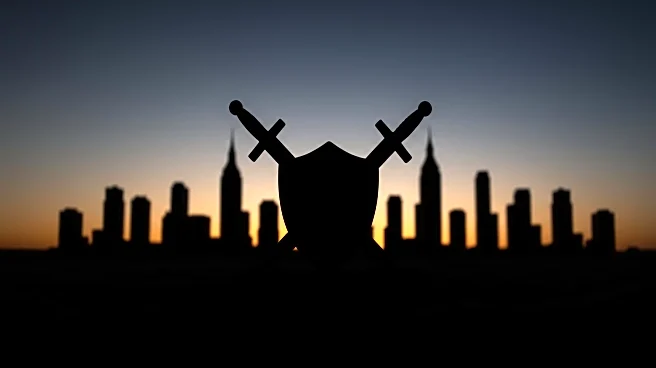What's Happening?
Defense Secretary Pete Hegseth has authorized National Guard members deployed in Washington, D.C., to carry firearms, following an order from President Trump. This decision comes as part of a military mission involving Guard members from D.C. and six other states. The Pentagon announced that the troops would soon be on mission with their service-issued weapons, although the specific type of firearms and whether they will be loaded remains unclear. This move follows President Trump's declaration of a crime emergency in the city and his decision to deploy the National Guard to patrol the area. Despite the Pentagon's statement, officials with Joint Task Force-D.C. have indicated that there has been no change to the current arming posture. The deployment has been met with criticism from local officials and residents, who view it as an unnecessary federal intervention.
Why It's Important?
The authorization for National Guard members to carry weapons in Washington, D.C., highlights the ongoing tension between federal and local authorities over crime control and public safety. President Trump's decision to deploy the National Guard and assume control of local policing has sparked controversy, with many residents and officials opposing the move. This development underscores the broader debate over the balance of power between federal and municipal governance, particularly in the nation's capital, where local autonomy is limited. The presence of armed National Guard members could have significant implications for public safety and civil liberties, as well as for the relationship between the federal government and local communities.
What's Next?
The situation in Washington, D.C., remains fluid, with potential changes to the arming posture of National Guard members still uncertain. President Trump has indicated plans to extend the deployment beyond the initial 30-day period and to apply similar strategies in other cities he views as poorly managed. This could lead to further federal interventions in local policing across the country, raising questions about the future of municipal autonomy and the role of the military in domestic law enforcement. The response from local leaders, civil rights groups, and the public will likely shape the ongoing discourse around these issues.
Beyond the Headlines
The deployment of armed National Guard members in Washington, D.C., raises important ethical and legal questions about the use of military force in civilian settings. The decision to arm troops in the nation's capital could set a precedent for future federal interventions in local affairs, potentially altering the landscape of American governance. Additionally, the move may impact public perceptions of safety and trust in law enforcement, as well as the broader relationship between the federal government and the communities it serves.








